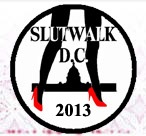SlutWalk and Sexual Empowerment

SlutWalk will come to Washington DC on August 13, and I am one of the main organizers for the march. SlutWalk is a grassroots movement to end slut-shaming, victim blaming, and rape culture. I joined SlutWalk DC because, as a transgender woman, I see and hear about sexual violence perpetrated against my community almost daily, from street harassment to rape and murder. I also joined because organizing a SlutWalk now, months after the first event in Toronto, presents a unique challenge because of the controversy other SlutWalks have already stirred up—and I love a challenge.
For humanists, SlutWalk has a potential that goes well beyond its anti-rape message, and that is the challenge it presents to religious moralizing around sex, especially the all-too-common belief that sex should remain a private matter solely between married, heterosexual, monogamous adults. SlutWalk refuses that paradigm by bringing sex out into the open. Any time our society engages in large-scale debates about sex, it’s an opportunity for humanists to challenge the close-mindedness of the Religious Right and other anti-sex religious crusaders. Every time a SlutWalk makes headlines—and they have been making headlines in countries including Canada, India, New Zealand, Mexico, the Netherlands, Brazil, South Korea, and the U.S.—it is a victory for all those whose sexual identities and lifestyles would be erased by religious fundamentalists. SlutWalk is a movement for women, but it is also a movement for LGBT individuals, sex workers, polyamorous individuals, swingers, and other sexual “outlaws.”
For me, the word “slut” is tied into my feminist awakening in college that challenged the confusion, denial and guilt around sex instilled in me by Catholic religious leaders. While I was already identifying as a humanist, it wasn’t until my college peers introduced me to the book Ethical Slut by Dossie Easton and Janet Hardy that I began developing a positive sexual ethics to replace the negativity instilled in me by religion. Easton and Hardy define “slut” as a “person of any gender who has the courage to lead life according to the radical proposition that sex is nice and pleasure is good for you.” This definition, combined with ideas from other third-wave feminist and queer theory texts, gave my peer group key language to build community around. In addition to leading my campus’s main LGBT group, I helped form a smaller break-out group called NOTA (for “None Of The Above”) where we discussed how our sexual /gender identities fell outside of “gay” or “straight”—identities such as bisexual, pansexual, queer, polyamorous, femme, dyke, transgender and genderqueer to name a few. Through NOTA I was able to accept myself as a queer transgender woman and became comfortable openly discuss my sexual desires with peers. I also found success for the first time with polyamory and open relationships. Ultimately what I learned from Ethical Slut and NOTA was that the more you communicated with your partner(s) about sex, the better your relationship—and the sex you had—ended up being.
This pattern of finding sexual empowerment after rejecting religion seems to be a common theme for many humanists, as discussed in blogger Greta Christina’s article, “Atheists Do It Better: Why Leaving Religion Leads to Better Sex.” This article focuses on a scientifically rigorous “sex survey of over 14,500 people–atheists, agnostics, and other people in the secular community,” that found that while nonbelievers and believers engaged in masturbation, homosexual acts, kinky sex, and sex outside marriage at about the same rate, the main difference between the two groups was that nonbelievers felt better about themselves and enjoyed their sex lives more. Those without religion also gave better sex education to their children and were more likely to communicate their sexual fantasies to their partners. Ultimately, this meant that they, their children, and their partners ended up leading happier, more fulfilling sex lives. All of which begs the question—shouldn’t humanists be doing more to offer society an empowering vision of human sexual ethics as an alternative to religious taboos and guilt?
Which brings me back to SlutWalk.— When one tries to frame SlutWalk as a feminist movement, or a movement about women, they miss its radical potential as a movement that is bringing discussions of sex and sexual ethics into broad daylight—and to the streets. The controversy it is causing, even amongst humanists and feminists, is proof that its strategy is working. And while its focus on proudly re-claiming the word “slut” makes it similar to LGBT Pride events, it has a grassroots energy missing from most city-wide Pride Parades, and a ferocity and sense of urgency that many LGBT individuals has unfortunately long faded since Stonewall. Even more exciting to me is that is creating activists out of many individuals that usually wouldn’t involve themselves in mainstream feminism, including the swinger, alternative lifestyle and poly scenes.
Many feminists have rightly pointed out that SlutWalk’s insistence on “slut” can alienate women of color or low-income women who experience the brunt of sexism in very different ways than white, middle-class women more readily able to wear the badge “slut” with pride, and I would look to hesitant SlutWalk participant Harsha Walia’s article “To March or Not To March” for an excellent analysis of this dilemma, and how to overcome it. SlutWalk is not a replacement for lobbying, litigation, or the work of organizations such as DC Rape Crisis Center and H.I.P.S.(Helping Individual Prostitutes Survive). But if done right, SlutWalk can help funnel new energy into already established feminist ventures. That is certainly my hope for SlutWalk DC—and I hope you’ll join us in DC on August 13.
